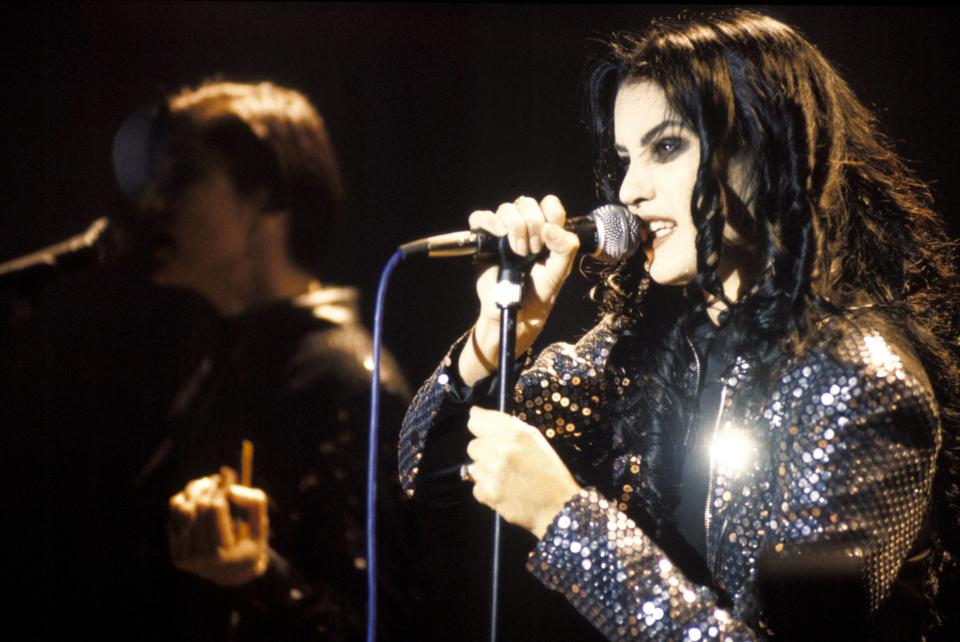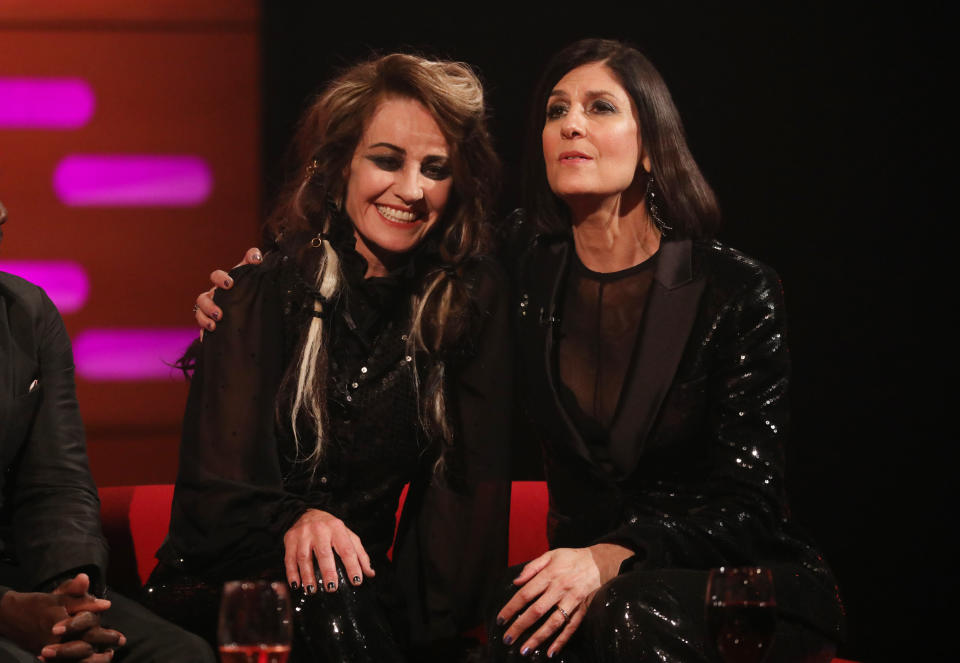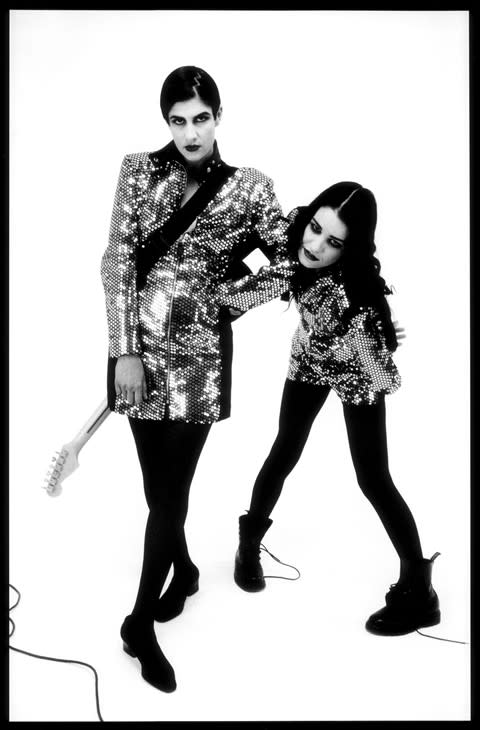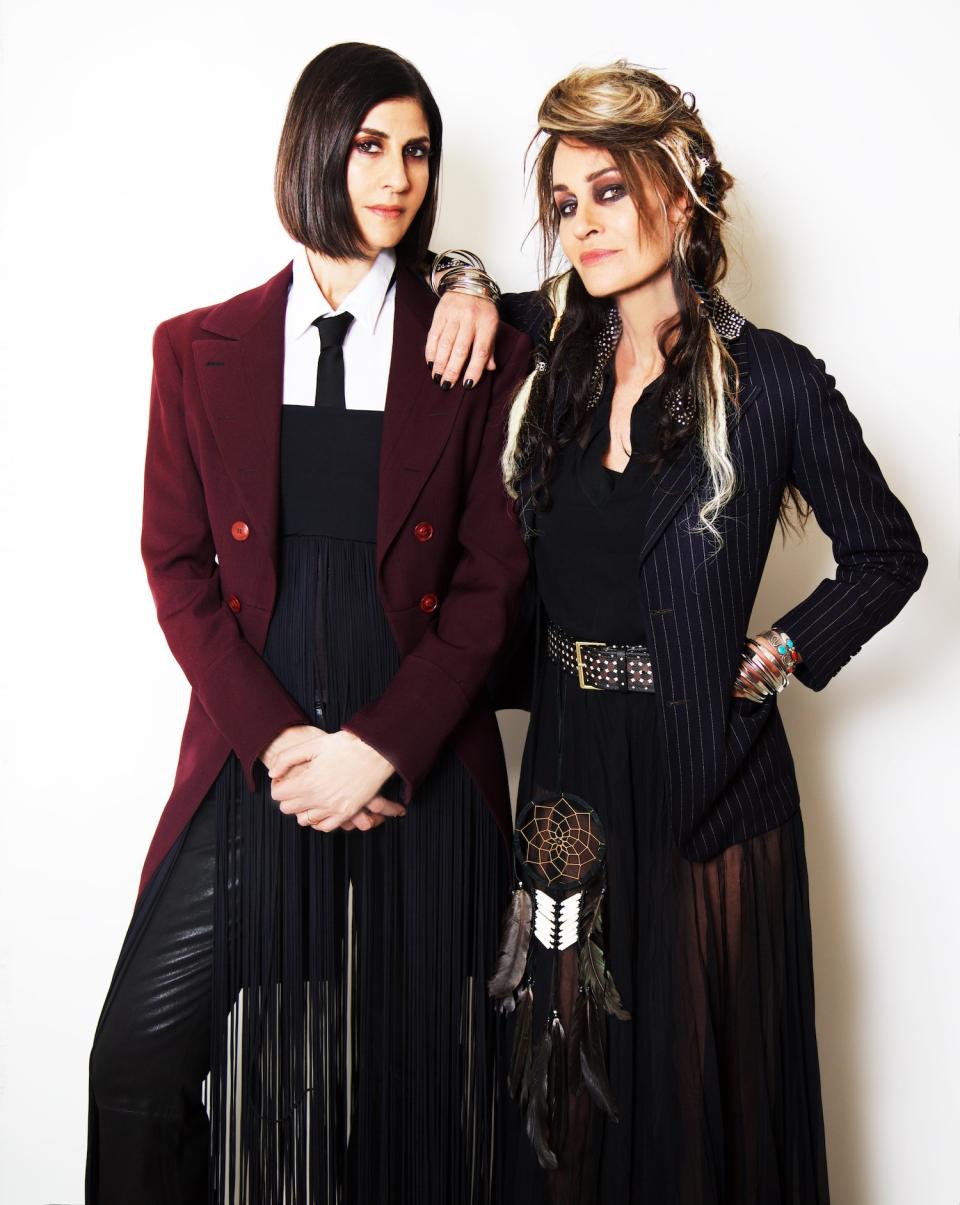All's well that ends well: Shakespears Sister’s epic tale of reunion and redemption
In 1992, Shakespears Sister, the glittering goth-pop duo founded by former Bananarama member Siobhan Fahey and veteran American musician and Clapton associate Marcella Detroit, were on top of the world. Their sophomore album Hormonally Yours, recorded at George Harrison’s famous Friar Park estate, had turned them into superstars — Glastonbury headliners, BRIT Award winners, handpicked Prince tourmates — with their gospel-tinged space-ballad “Stay” topping the British singles chart for eight weeks (it still holds the record for longest-running U.K. No. 1 for an all-female band) and rocketing to No. 4 in the States.
But by May 1993, it was all over. And the partnership ended in such a spectacular, Shakespearean fashion that Fahey and Detroit didn’t speak for 25 years… when they ultimately discovered that their brutal breakup was all part of a massive misunderstanding. Now the two women are participating in one of the most unlikely, against-all-odds band reunions of all time.
“From my perspective, the beginning of the end was when ‘Stay’ became our biggest hit,” Detroit recently wrote on her website. “There were lots of fights between us and considering it was supposed to be a wonderful time with lots of success, it was unfortunately filled with petty bickering and jealousies. I was accused of trying to steal the band away from her, ridiculed and pitted against constantly.”
Things came to a head when Fahey, dealing with various personal issues, canceled the band’s much-anticipated concert at Royal Albert Hall at the last minute. Shakespears Sister made one more live appearance months later at a Smash Hits Christmas show in London, and then took what Detroit assumed would be a temporary hiatus. It was at the 1993 Ivor Novello Awards, at which Hormonally Yours won the Best Contemporary Collection of Songs honor, that Detroit — who attended the ceremony, while Fahey was in the hospital with a prolapsed disc — learned, along with the public at large, that she had been dismissed from Shakespears Sister.
Fahey's brief acceptance speech, delivered in absentia by Fahey's publisher, ended bluntly with "all the best for the future, all's well that ends well." Detroit later wrote on her website, “I couldn't wait to get back to my seat. I just hung my head and sobbed silently for about five minutes trying to let go all the stress, all the painful things I'd experienced especially in the last year.”
“It always bothered me that I thought somebody out there really hates me,” Detroit now tells Yahoo Entertainment/SiriusXM Volume a quarter-century later, as she sits in surprising harmony alongside Fahey. “It's not very pleasant, because I'd hear stories about things that were said, and I was like, damn. So I tried to reach out a few times, but I guess it wasn't meant to be until [now]. Sometimes that's just the way it is.”
Fahey is aware of her reputation stemming from that Ivor Novello incident. “‘Difficult to manage.’ ‘Hard to handle.’ ‘Siobhan Fahey's obviously the difficult one.’ ‘She can't stay friends with anybody,’” she snarks. But she clarifies that it was never her intention to dump Detroit via an awards-show speech. “We'd broken up months before that. I hadn't told Marcy that; I just assumed that she knew, because we hadn't spoken for six months.”
“I didn't know,” Detroit says softly. “That was the first time I had heard that. There was bad communication within management and people that were surrounding the band, and it just kind of pitted us against each other.”

“But it's turned into I'm this ‘bitch’ who made this announcement in a public ceremony, which isn't true,” says Fahey. “We had different stories. And those stories had built up over the years.”
“I always thought one thing and Siobhan thought another, so when we got together, she aired her grievances and I was like, ‘Oh, well, actually that's not what happened. That's not my side of the story,’” says Detroit.
“I have to say [regarding] the lack of communication, mea culpa,” Fahey adds. “I come from a family where if we did air our grievances, it would turn nasty. So you didn't say anything. I come from a [British] culture where you don't do that. You just walk off with your dignity intact. And that's what I did. But then after moving to L.A. and doing Kundalini [yoga] for years, I wanted to evolve. I wanted to be able to heal that rip.”

Marcella admits that it was easy for her to hold on to old grudges, but “we talked a lot. We commiserated. We discussed stuff that happened in the past. It got very personal and very emotional, and everybody has their side of the story, but it's just allowing yourself to be open to share that and be vulnerable. And that's difficult. A lot of people don't want to go there.”
“I don't think it's easy to communicate really honestly and openly without it being antagonistic,” muses Fahey. “I think we don't learn how to do it. But we both needed and wanted, separately, to lay to rest the ghosts of our uncomfortable relationship all those years previously — just for our own souls and our own healing. It took a bit longer than it should have done. But you know, most people never actually do that. I am really happy that we were both able to get to that point where we were able to do that. It immediately helped us understand how that situation had evolved in the first place. … So I'm here to say, and we're both here to say, that it's really great if you can do it. It is very healing.”

Interestingly, in that 1992 phone conversation when Fahey canceled their Royal Albert Hall show, Fahey had told Detroit, “One day, I'd just like to come over, sit down and have a cup of tea with you and be your friend.” Fahey and Detroit were finally both in reconciliatory states of mind when they agreed to have that cup at an “arranged meeting, like an arranged marriage” at a Los Angeles café in 2018. Detroit had just had an “amazing, cathartic experience” joining her old colleague Eric Clapton onstage in London’s Hyde Park (the first time she and Clapton had played together since 1985), and Fahey had just come off a successful reunion tour with Bananarama.
“Our lives were strangely mirroring each other, and it's like resolution all around — like broken circles coming full-circle,” says Fahey. “One [reunion] inspired the other, for sure. By doing the Bananarama thing, it was reconnecting with a part of myself that I had left behind — and there was another piece that I'd left behind [with Shakespears Sister] that I needed to connect to.” Fahey reveals that she did write a Bananarama single that she “thought was shaping up beautifully” but her on/off Bananarama bandmates, Sarah Dallin and Keren Woodward, “didn't want to go forward with it. So at that point, I was really dying to make new music. … And it all worked out for the best, the way it's meant to.”

Ironically, it was their differences, and their friction, that made Fahey and Detroit such a creatively interesting and successful pairing in the first place. “I think the two of us were unusual bedfellows at the time and came from very different inspirations culturally,” Fahey explains. “My background was more glam/art-rock/British punk with the Tamla influence, but Marcy was more purist blues-rock/soul. She's a highly skilled musician and singer; I come from a D.I.Y., almost anti-musician stance. So back then, we didn't really get each other. We just created really well together. It was said that the dichotomy worked really well, but we didn't really appreciate what the other person brought.”
However, once the women were able to move on from their troubled past and started working together again, that old creative magic — along with a new appreciation for it — was still there. During a writing retreat in Joshua Tree, they made “strange sounds” “steeped in Americana and California's landscape and the whole energy of the wild west,” as Fahey puts it. Detroit amusingly recalls banging on the corrugated metal on an outdoor bathroom, “recording it along with the howling wind. The wind just howls through there. It's pretty wild.”
Back on the subject of “Stay,” Fahey describes it as “the Trojan horse that sold a million albums” and “a blessing and a curse.” The spooky, weepy ballad, co-written with Fahey’s husband at the time, Dave Stewart of the Eurythmics, sounded very different from the rest of Hormonally Yours, with Detroit’s bell-clear soprano voice featured much more prominently than Fahey’s evil, sultry growl. The song’s Sophie Muller-directed video also served mainly as showcase for Detroit. “Stay” was actually released as a single by the band’s label against Fahey’s wishes. But when Fahey and Detroit shot a new video this year with Muller for their Ennio Morricone-esque comeback single, “All the Queen’s Horses” — which along with another cheekily titled new tune, “C U Next Tuesday,” appears on the duo’s best-of compilation Singles Party — they cleverly played up the mythology of their “Stay”-era rivalry.
The “All the Queen’s Horses” video opens with the badass frontier women confronting each other, old-school-western-style, in a sepia-toned ghost town saloon, while PTSD flashbacks of the “Stay” video race through their minds. They even have two drag queens, including Morgan McMichaels from RuPaul’s Drag Race, catfighting in “Stay”-inspired costumes. “The song is about a relationship that goes wrong and the hurt and the pain and the aftermath of that. It wasn't necessarily written about us, but it was written from a bit of personal experience and could be applied to any relationship that leaves you very damaged. Everybody assumed it was about us, so we ran with that ball when we made the video,” laughs Fahey.
A five-song Shakespears Sister EP is coming later this year, and it seems like the timing is perfect for the duo’s comeback, since it could be argued that the two witchy, glitchy, indie-pop albums that Fahey and Detroit made together (the other being their 1989 debut, Sacred Heart) paved the way for today’s Grimes, Sky Ferreira, Lorde, Charli XCX, and Zola Jesus. But Fahey admits that she has no idea what the long-term future holds for Shakespears Sister; she’s just delighted right now that she and Detroit have mended their friendship and are making art again. And she is hopeful for what’s next.
“I've led many different lives in the name of ‘Siobhan Fahey.’ I get my life really good, and then I smash it to smithereens and then crawl from the ashes — not necessarily better, just different,” Fahey chuckles. “I've had about five lives so far. Hopefully I've got nine.”
The above interview is taken from Shakespears Sister’s appearance on the SiriusXM show “Volume West.” Audio of this conversation is available on demand via the SiriusXM app.
Read more from Yahoo Entertainment:
Siobhan Fahey on Bananarama's reunion, punk past: 'We're only just getting recognition now'
Berlin’s Terri Nunn on how she got her ex to play an 'a**hole' on new track 'Show Me Tonight'
The never-ending story of viral hit 'The NeverEnding Story': A '#Challenging' Q&A with singer Limahl
Follow Lyndsey on Facebook, Twitter, Instagram, Amazon, and Spotify.
Want daily pop culture news delivered to your inbox? Sign up here for Yahoo Entertainment & Lifestyle’s newsletter.


